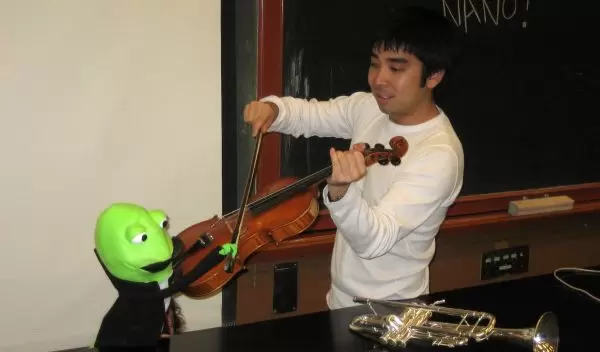
Nanotechnology Video Wins Competition, Scores Big Hit on YouTube
Ryan Miyakawa, an engineering graduate student at the University of California Berkeley, created a video on nanotechnology that turned into a runaway hit online, with almost 400,000 views on YouTube alone.
Miyakawa is a former Fellow in the National Science Foundation's (NSF) Graduate STEM Fellows in K-12 Education (GK-12) Program. He produced the video for an American Chemical Society (ACS) competition held early this year.
The ACS's Nanotation NanoTube is an effort that invites researchers to use the video medium to communicate about nanoscience. ACS Nanotation sponsored a "What is Nano?" video contest, which sought creative videos of up to three minutes in length that conveyed the scientific and cultural significance of nanoscience to a broad audience. Contestants' videos were posted to the Nanotation site, and members of the general public were invited to vote on their favorite video.
Thirty videos were submitted and were judged in two categories, with winners announced at the end of March. Berkeley's "The Nano Song" won for both Critic's Choice and People's Choice.
Miyakawa and some of his fellow graduate students had entered the competition at the recommendation of a faculty adviser. Miyakawa began by writing the music and lyrics for a song about the wonders of nanotechnology.
"Writing the song was the easiest part," he said. "The project ended up being a lot more work than I thought."
Ultimately, the video featured UC Berkeley junior Glory Liu--a classics and political economy major with three years of classical music training--doing the vocals, cheerfully explaining nanotechnology to a band of puppets. Lyrics include the lines, "A million nanometers that are lined up in a row/Are just about as long as a single flake of snow ..."
Patrick Bennett, a friend and fellow engineering grad student, had almost majored in film studies, but had chosen nanoscience instead. He was a logical choice to help produce the video. Nola Klemfuss, a roommate's girlfriend, designed the larger puppets used in the production, and those that "played" musical instruments. Other puppets were purchased.
The production team spent the better part of three days preparing the puppets and writing and choreographing each scene. Then they shot the movie in one day and spent the next week editing it. The video is both entertaining and enlightening about nanoscience.
"We wanted it to be accessible to anyone," notes Miyakawa.
The piece went online Feb. 22. After the video was picked up by boingboing, a popular blog, it appeared in the online editions of Scientific American, and Nature, as well as the front page of YouTube.
"We were surprised at all the attention," said Miyakawa. "This all happened in about three or four days."
Miyakawa is in his fourth year of graduate studies, with plans to graduate next year. His research in the area of extreme ultraviolet optics has been partially funded by NSF. In his third year, he was a GK-12 Fellow. This program supports graduate students in conducting research and bringing their experience and research findings to K-12 classrooms, thereby helping the grad students communicate their science to the public while enhancing the science knowledge in schools.
Miyakawa's fellowship led him into eighth-grade classrooms in the Berkeley area. Among his goals was to incorporate his leading-edge research in optics and photonics into the classroom by working with the teacher to redesign some of the lessons and lab activities.
"Most of the eighth-graders hadn't heard of lasers," said Miyakawa. "It was helpful to show them how lenses make images, how light travels in rays, and to build periscopes to look around corners."
The experience offered an opportunity for growth in communicating complex science to diverse audiences, which has paid off in projects such as "The Nano Song."
"I really enjoy teaching a lot, and I love working with the students."
The quick rise to video stardom prompts many people to ask about the group's next project. While they haven't made a decision yet, Miyakawa points out, "We're scientists that are into music. We'd like to find a scientific topic that's important and go from there."
In the meantime, the ACS competition yielded $1,000 in prize money ($500 for each of the two categories). When this story went to press, the group was planning a dinner out at Berkeley's Chez Panisse, and was going to use the rest of the money toward their next video project.


